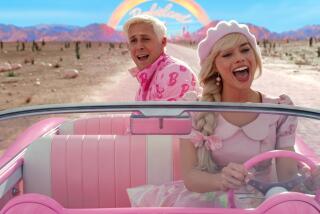Meet Maren Ade and ‘Everyone Else’
“Everyone Else,” the second feature film written and directed by German filmmaker Maren Ade, is, among other things, a very apt demonstration of the fact that you can’t judge a film by its synopsis.
The particulars of said synopsis sound mighty familiar: The film is nominally about a young couple, seemingly secure in certain aspects of their compatibility (they have a few pet names for each other) but also relatively new to each other, and how their bond is tested on a vacation. Sounds like something any indie or foreign film enthusiast has already seen a sufficient number of times.
But “Everyone Else,” which opened Friday in Los Angeles, is not at all like anything else. Ade’s film is an immediately striking, often funny, occasionally exasperating study of characters and circumstances that’s richly and provocatively detailed, featuring two staggeringly committed and concentrated lead performances by Birgit Minichmayr, who plays the relatively free-spirited but peculiarly approval-seeking Gitti, and Lars Eidinger, as the somewhat more overtly strait-laced and career-anxiety-laden Chris, whose familial vacation home in Sardinia provides the film’s main setting.
For many, watching the film is to watch the emergence of a very particular and potentially galvanic cinematic talent.
“I first saw the film at the Buenos Aires International Festival of Independent Cinema, where I was a juror, in spring of 2009,” recalls film programmer and critic Kent Jones, who heads up the World Cinema Foundation, the international arm of Martin Scorsese’s film preservation concern the Film Foundation. “In the middle of the screening, the projector broke, and I remember turning to another juror, a director, and asking, ‘Is this as good as I think it is?’ And we were both bowled over in the same way. It’s a picture that feels very loose in the beginning but as it goes on you realize it’s a picture of incredible precision.”
The 33-year-old Ade first picked up a camera at age 15, she says, in an interview conducted via e-mail. “I did stupid things like remaking famous commercials, and then after a while, I wrote something like an actual script and forced my friends to play in it.” She then studied at the University of Television and Film Munich. “I wasn’t all that much of a cinephile growing up, but I did, and still do, get a lot out of the films of Cassavetes, Bergman, the French New Wave directors, Maurice Pialat.”
After her first feature, 2003’s “The Forest for the Trees,” about an alienated young school teacher, Ade says she was interested “in taking on main characters that are more like me, sociologically. I wanted them to have a similar day-to-day experience and similar professions. In itself, there’s nothing in the film that’s overtly autobiographical, but there is a lot of me in [“Everyone Else”], that’s just inevitable.”
The scenes in which Chris first insists on avoiding a friend and professional colleague / tacit rival, and those showing what results when hanging out with the seemingly more successful fellow and his adoring wife, have a tang that can only spring from sharp observation. “I’m not interested in re-creating a reality,” Ade notes, “but I do look for heightened drama.”
For all her precision as a filmmaker, Ade didn’t go into the production process on “Everyone Else” believing that her material was entirely cut and dried. After spending several years polishing the script — “compared to the position of American independent filmmakers, I feel kind of ashamed of the luxury situation we have in Germany, where you can get state funding to spend a couple of years writing a film” — Ade knew that she had to, in a sense, turn the film over to her actors.
“It was clear from the beginning that the actors came first and that the camera had to give them lots of freedom,” she said. “Over the course of about a half a year, we rehearsed for almost a month — reading the script, trying out scenes. On the set we experimented a lot with the text, and we ended up having a high shooting ratio, filming much more than we ended up using. When you let the camera roll for such a long time, the reality you’re capturing on the film becomes a space in its own right, allowing the actors to follow the rhythms they create. The process takes a lot from the actors, because they have to be emotionally transparent but technically mindful. All of the actors gave a lot to their characters, and I’m very grateful for that.”
Ade recently returned from three months in Cameroon, producing “Sleeping Sickness” for director Ulrich Kohler. And she’s just begun working on a new script. For many European directors, and especially in today’s increasingly globalized market, the idea of tackling an English-language project can be something like a siren song. But Ade’s not sure she’s ready for such a thing yet. “I think I would be afraid that I wouldn’t be able to direct at the level I do in my native tongue,” she says. “It’s a pity, because you have so many great actors.”
More to Read
Only good movies
Get the Indie Focus newsletter, Mark Olsen's weekly guide to the world of cinema.
You may occasionally receive promotional content from the Los Angeles Times.






